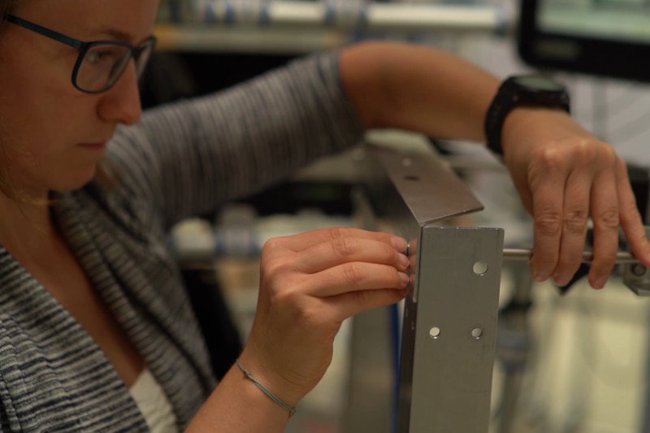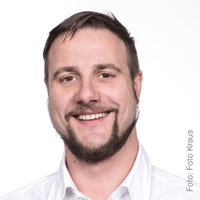Protection of Personal Data in Industry 4.0
Guaranteeing Staff Privacy in Tracking Technologies

In digitalised production, more and more companies automatically track the position and condition of production means in their business – a technology which allows them to view the location of their employees as well. While this may increase work safety, it also raises questions of personal data privacy.
A project funded by the Chamber of Labour Lower Austria and jointly carried out by the St. Pölten University of Applied Sciences, TU Wien and the social accident insurance company AUVA investigates how the privacy of employees can be protected while using such systems.
Tracking Objects and Persons
Tracking systems are increasingly gaining in importance within the framework of digital networks in Industry 4.0. They use radio technologies such as Wi-Fi, Bluetooth and RFID to capture the position of objects including transport equipment, tools and carriers like pallets and crates. This allows for the improved documentation of production processes.
“The recording and use of near real-time position and condition data – so-called ‘asset tracking‘ – is already standard in many branches of the industry. The application of such tracking systems will certainly become even more frequent in future”, explains Christian Jandl, researcher at the Institute of Creative\Media/Technologies of the St. Pölten UAS.
However, the technology used also enables new ways of recording and analysing the position of employees over time, which is referred to as employee tracking. This can be done actively with the objective of increasing safety in dangerous workplaces or to locate staff members in case of an accident. That being said, the systems can also collect position data from employees’ mobile devices such as smartphones and smartwatches on a massive scale without the affected persons’ consent.
Protecting Private Data by Accessing Them with Consent Only
“Location data of employees are sensitive information. From a privacy perspective, this information should be collected only with the consent of the affected persons and only if it creates added value for them”, says Thomas Moser, head of the research group Digital Technologies at the Institute of Creative\Media/Technologies of the St. Pölten UAS.
The research project “SensiTrack – Tracking vs. Privacy in the Working World 4.0” investigates two central questions: how can we make sure that the use of localisation services does not cause any data protection problems? And which measures allow us to benefit from the positive aspects of the new technology in a way that is meaningful for employers and employees?
Test in Pilot Factory of TU Wien and Workshops for Companies and Works Councils
The project develops measures to make it possible to support the positive aspects of the technology in terms of work safety and to deliberately restrict the potential for monitoring employees at the same time. This applies to measures pertaining to the storage and processing of data but also to the introduction of new processes in businesses.
“Employee tracking has to be seen as a balancing act that requires a high level of trust on the part of the employees as well as maximum transparency on the employers’ side”, emphasises Martina Hartner-Tiefenthaler from the Institute of Management Science at TU Wien. For this reason, the project team examines which factors influence employees’ acceptance concerning the use of tracking systems, and what trustworthy tracking systems could look like. As a consequence, guidelines for companies could be formulated that sensitise both employers and employees for this topic.
80 test persons were recently involved in an experiment carried out at the Pilot Factory of TU Wien in Aspern as part of the project. Following the evaluation, the results will be made available to the Lower Austrian Chamber of Labour, for example in workshops with works councils members planned for the spring of 2021.
Project SensiTrack
The St. Pölten UAS carries out the project together with the Institute of Management Science of TU Wien and the social accident insurance company AUVA. The project is financed by the Lower Austrian Chamber of Labour through the Project Fund Work 4.0.

Dipl.-Ing. Christian Jandl , BSc
Head ofDigital Technologies Research Group
Institute of Creative\Media/Technologies Researcher
Digital Technologies Research Group
Institute of Creative\Media/Technologies Department of Media and Digital Technologies